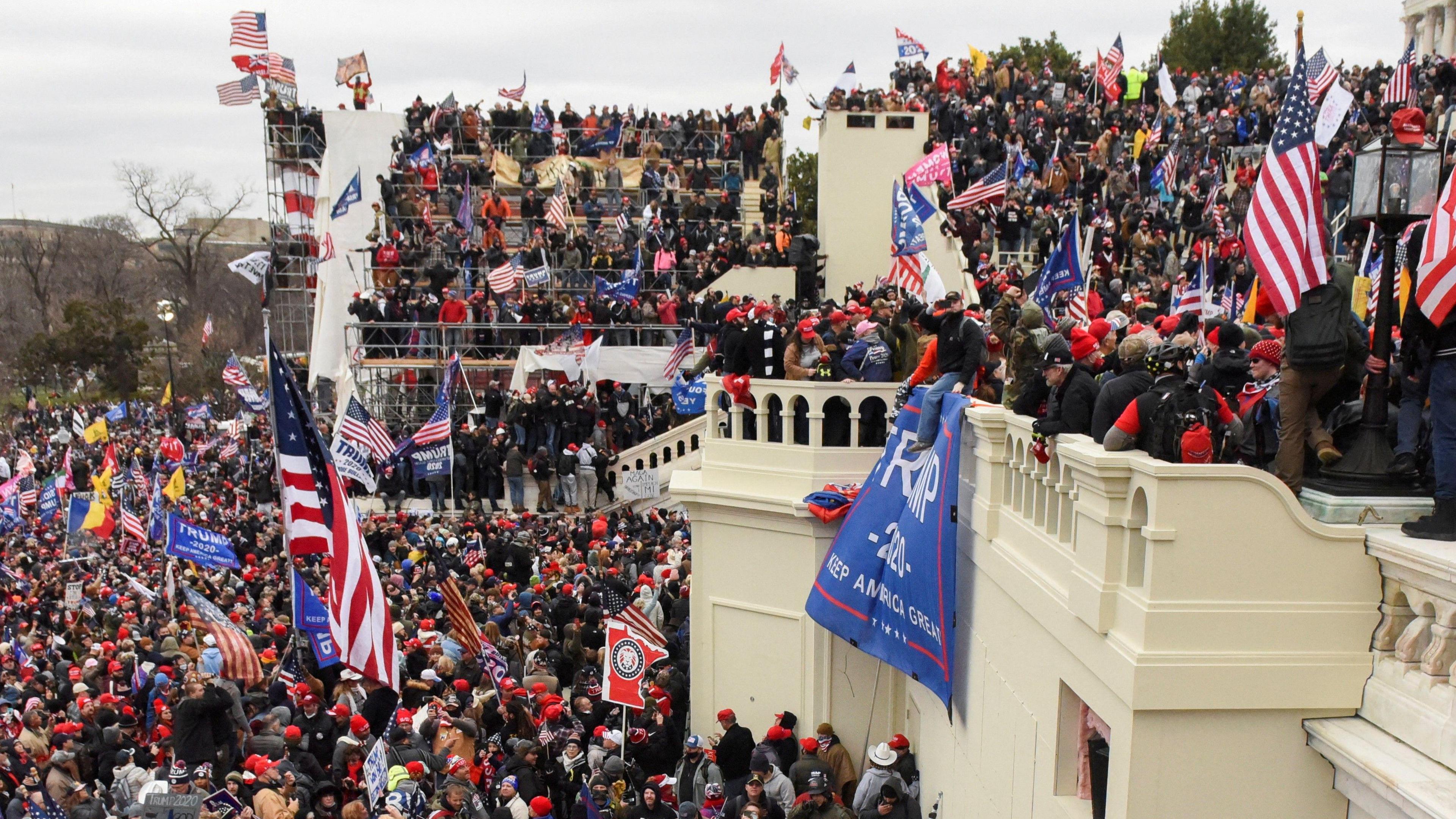'Man of his word': Jan 6 rioters expect Trump will keep pardon promise

- Published
Out of all of Donald Trump’s supporters, Derrick Evans has a particular reason to be happy with November’s election results – he hopes the president-elect will give him a pardon for participating in riot at the US Capitol on 6 January 2021.
“A pardon will be life changing,” said Evans, who was a member of the West Virginia legislature when he and at least 2,000 others stormed Congress. It was part of an effort to overturn the results of the US election, inspired by the false belief that it was Trump, not President Joe Biden, who had won.
He reached an agreement with prosecutors which saw him plead guilty to civil disorder and spent three months in federal prison in 2022. On the campaign trail, Trump repeatedly said he would pardon the rioters, whom he has called “patriots” and “political prisoners”. But who exactly might be pardoned - and when - is still an open question.
“I believe he's a man of his word,” Evans told the BBC.
In March, Trump wrote on his Truth Social account that one of his first acts as president would be to “Free the January 6 Hostages being wrongfully imprisoned!”
He repeated the pledge at a National Association of Black Journalists forum in Chicago in July.
"Oh, absolutely, I would,” he said. “If they're innocent, I would pardon them."
But he has stopped short of proposing a blanket pardon, at one point telling CNN: "I am inclined to pardon many of them. I can't say for every single one, because a couple of them, probably they got out of control."
His campaign has previously said decisions would be made “on a case-by-case basis when he is back in the White House”.
Arrests still being made
The events of 6 January resulted in one of the largest federal investigations in US history. Nearly 600 people have been charged with assaulting, resisting or impeding police officers.
Some of those who have been given the longest sentences, such as Oath Keepers founder Stewart Rhodes and Enrique Tarrio, leader of the Proud Boys, did not participate in the violence inside the building. Instead, they were convicted of seditious conspiracy and other felonies for organising the melee.
Arrests are still being made. In an update issued last week, the FBI said it is still looking for nine suspects wanted for violent assaults on police officers.
But with Trump coming back to the White House, the future of the investigation remains uncertain.
Citing justice department sources, NBC News reported that officials are focusing on trying the “most egregious” cases before Trump’s inauguration on 20 January.
Delayed hearings
In the meantime, several Capitol riot defendants have asked for hearings to be delayed in anticipation of pardons.
Among them are Christopher Carnell, a North Carolina man who was found guilty of several riot-related charges earlier in the year. His lawyers asked for a hearing to be delayed last week because of possible "clemency actions relevant to his case”, but the request was turned down.
Jonathanpeter Klein, who along with his brother Matthew pleaded guilty to several charges in July, asked for his sentencing hearing, scheduled for 15 November, to be delayed. That request, too, was turned down.
A lawyer for Joe Biggs, a member of the Proud Boys who was handed one of the longest riot-related sentences, told reporters that he would be asking Trump for a pardon.
Biggs was sentenced to 17 years in prison in 2023 after being convicted of crimes including seditious conspiracy, intimidation or threats to prevent officials from discharging their duties, and interference with law enforcement during civil disorder.
During the riot, Biggs and others led a group of Proud Boys, tearing through barriers and barging into the Senate chamber.
At trial, Biggs and others argued they were merely following Trump’s orders. His lawyer, Norman Pattis, told reporters in Florida that he would be seeking a pardon from the Trump administration.
Wendy Via, co-founder of the not-for-profit Global Project Against Hate and Extremism (GPAHE), said that there is already a sense of excitement among rioters and their supporters.
“Folks on fringe sites are calling for the release of what they are calling the Jan 6 ‘prisoners of war’ or ‘hostages’,” she said.
They include Jake Lang, who is charged with a number of crimes including assaulting police officers, and who regularly posts online from his jail cell in New York.
After Trump’s victory he wrote on X: “IM COMING HOME!!!! THE JANUARY 6 POLITICAL PRISONERS ARE FINALLY COMING HOME!!!!”
“In just 75 days on January 20th 2025, when Donald J Trump is inaugurated as the 47th President of the United States, he will pardon all of the J6 Hostages.”
Laying low
GPAHE also found that some groups plan to lay low until Trump takes office and pardons are made official.
One post on a Proud Boys channel on Telegram suggested that members avoid the January inauguration: “Stay home or patronize your local watering hole and celebrate the inauguration of our President and the imminent release of our Boys.”
In a blog post, Via said pardons would “make a mockery of our justice system, and it will send the message to his followers that violence is a legitimate response to political outcomes they don’t like”.
For the moment, the release of everyone charged with riot-related offences seems unlikely, but non-violent offenders such as Derrick Evans have called for large numbers to be freed.
And, he suggested, a pardon would not be enough to compensate him and others for the time they spent behind bars.
“I think there needs to be some reparations and restitution involved as well,” he said.

North America correspondent Anthony Zurcher makes sense of US politics in his twice weekly US Election Unspun newsletter. Readers in the UK can sign up here. Those outside the UK can sign up here.